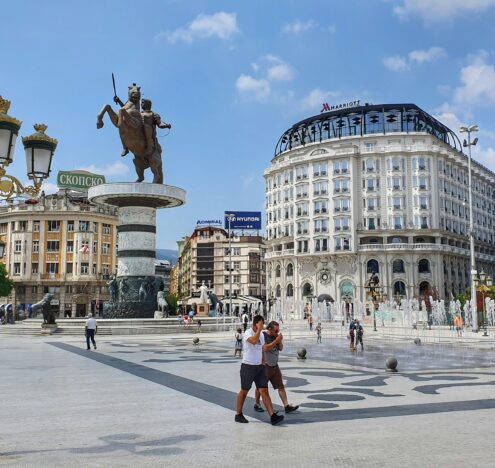“The Changing of a Continent” is a column by journalist Kenneth R. Rosen that focuses on the US trans-Atlantic relationship and Europe’s future.
The words of the writer and journalist Roberto Saviano, known the world over for his expose “Gomorrah,” a book that drew wide praise and shunted the author into a reclusive life of police protection and solitary commentary, rung in my head as I walked the streets near my apartment in northern Italy. After Giorgia Meloni’s right-wing nationalist party won the majority in parliament last month, launching her into the nation’s premiership, Saviano wrote that Meloni was a danger to democracies across Europe “because Italy has always been a laboratory: it has foreshadowed the crises of other countries.”
Maybe he was right. Italy has long been the “sick man of Europe.” It is, at times, the weak underbelly of the European Union. But how far could Meloni dismantle a government and society that had frayed long before her arrival? What would the next several months look like with her as prime minister? I wasn’t certain it’d be all bad.
If history teaches us anything, from the immediate days following World War II to its infighting over support for Ukraine, Italy falls in line with the majority.
The Northern Italian city where I live with my family, Turin, once the national capital and home to the Fiat car manufacturer, is one of two metropolitan areas in the country’s wealthier north that voted for the leading Democratic party. The city’s outskirts, stretching out into bucolic fields and vineyards along the Po River, voted for Meloni.
As I walked and recalled Saviano’s words, I passed the local chapter of the Partito Socialista Italiano, the Italian Socialist Party. I had thought perhaps I was entrenched in a liberal city with values to match my own. So, wasn’t the calm existence of these political headquarters, beyond whose glass-pained exterior sat men in suits talking to a thin crowd of Grey-haired neighbors, evidence that things wouldn’t change for the worse, that we were entering a new, potentially scarier chapter in European history, but that things could carry on without damage to the fibers of the nation’s democratic promise?
HAVEN’T WE BEEN HERE BEFORE?
These questions had arisen from the political fallout, but they mainly stemmed from the curious messages I received from friends and family who lived outside the country.
They worried for us.
They compared the rise of Meloni to the rise of right-wing nationalism back home (the United States for me), in part because one of Meloni’s “frenemies” was the toxic Matteo Salvini (known here as “Italy’s Trump”). Caustic in his messaging about everything from immigration to Peppa Pig, Salvini was the portent for Meloni’s takeover. After all, Silvo Berlusconi once led the country as prime minister, and despite the damage that did to a national conscience, Italy survived.
Long divided, the nation feels like it’s on a perpetual brink. Still recovering from dual recessions and hardships stemming from the coronavirus pandemic, Italy is no stranger to turmoil. Over the last several years, voters have tirelessly gone to the polls to elect new officials after governments were formed, then fumbled after hardly two years in power. As a result, the instability is virtually de rigueur, no matter who is in charge, the left or the right.
Already we’ve started to see cracks form in one of the basic premises of Meloni’s coalition: cohesion. The fascist Ignazio La Russa was elected president of the Italian Senate yesterday as members of the incoming government’s coalition abstained from the vote, a riff in a three-party government that has yet to take power and test the staying power of one of Meloni’s campaign promises to voters.
MOVING ONWARD
When we moved from a quiet village in the Veneto region — Meloni majority — a family member warned us we’d be back. When asked why he felt we’d flee the city after only six months, he warned that we’d see increased crime and come running because of the influx of migrants and foreigners. This type of xenophobic commentary is pervasive but speaks to distance from understanding rather than understanding itself. It isn’t even fear, for this family member hasn’t encountered anyone from outside the village he hasn’t known his entire life. It’s rhetoric that assures one of some deep conviction and authenticity that belies a sense of greater misfortune. Then again, that’s my conviction imposing on someone else’s. The point here is that there has been little change.
Many fear Meloni’s rule will usher in the end times. Others, like Saviano, fear that what happens here will spread elsewhere in Italy. What’s true is that Italy is impressionable, much like my family member, influenced by external ideas and notions it doesn’t quite understand. If history teaches us anything, from the immediate days following World War II to its infighting over support for Ukraine, Italy falls in line with the majority. We see far-right movements in Sweden, the United States, France, and Germany.
The nation has defined itself more frequently by what it is not and by who it mimics, no longer innovating but repurposing neighboring ideas. That’s what worries me. Meloni will be gone in 18 months, the fatality of another governmental collapse, and what will come is presently uncertain save for its uncertainty. But then, Italy is no stranger to uncertainty, right-wing leaders, or even fascist tendencies. The real question for Italy is: Does Meloni represent a moment in time or a fundamental shift in Italy’s political landscape? Only the next election will tell.





















